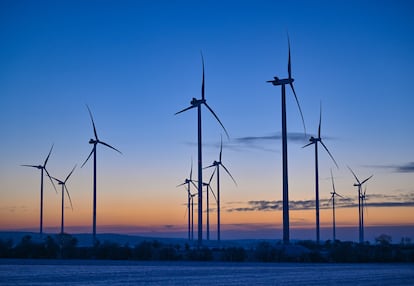Cold without wind: German ‘dunkelflaute’ brings electricity prices to crisis levels and depletes gas reserves
German consumers will pay almost €400 per megawatt hour on Thursday, the highest figure since the end of 2022

Dunkelflaute is a cursed word in the German electricity sector. The combination, typical of cold anticyclones, of low temperatures (which increase demand) and the almost total absence of wind (which hinders wind generation) configures one of the worst possible scenarios for the price of electricity: it forces the burning of more gas in combined cycle plants, which are much more expensive, and that substantially increases the bill. This dreaded cocktail, which is currently hitting Central Europe, is leading the price of electricity in Europe’s largest economy to levels not seen since the energy crisis.
German consumers will have to pay an average of €395 ($414) per megawatt hour (MWh) on Thursday, the highest value since December 2022, at the height of the Russian invasion of Ukraine and when fears about European natural gas supplies were more than justified. In some parts of the day, you would have to go back even further to find similar values: between 5 p.m. and 6 p.m., the German wholesale market exceeded €936 ($981) per megawatt hour. This is the highest figure in 18 years.
The main factor behind this escalation is the lack of wind. While at this time of year Germany’s powerful wind power sector (onshore and offshore) usually averages almost 20 gigawatts (GW) of power, according to data from the specialist portal Montel, thus becoming the country’s main source of electricity, on Wednesday it will just exceed 3 GW. With the cloudy skies, solar photovoltaic power is also operating well below its potential and forces combined cycle plants — in which gas is burned to obtain electricity — to operate at a higher rate than usual, driving up prices.
Unlike the worst days of the 2022 energy crisis — when the price of gas, at historic highs due to the Russian invasion of Ukraine, was the main trigger and the main focus of concern — now the situation is purely temporary: when the wind returns and temperatures rise, the wholesale electricity market should also return to normal. In fact, this is not the first episode of this kind in recent months: in November, the bad streak of wind power pushed the German price above €800 ($839) per MWh in some hourly periods, only to fall back in the following days.
Less gas stored
Relying on combined cycles to meet demand not only has an impact on prices. Gas stored in underground tanks, a variable that has been closely scrutinized since the energy crisis, has fallen sharply in recent weeks. Compared to 98% of gas in early November, German reserves of this vital fuel for heating and industry are currently around 87% and have accelerated their decline in recent days.
The average European reserves are at 80% of their capacity, also falling sharply (by 15 percentage points) over the last five weeks. In November, for example, the decline in continental reserves was the fastest since 2016 due to the greater use of combined cycles and also heating. “Reserves are decreasing more than expected, although they remain at very healthy levels,” say analysts at Arcano Research.
No one doubts, in short, that there will be enough gas to get through the winter, even if temperatures drop more than expected in January and February. However, the premature emptying does augur more difficulties in refilling the tanks for the next cold season. The energy consultancy ICIS, for example, estimates that the tanks will close 2024 only slightly above 70% and will be at around 33% of capacity at the end of March, when the cold season typically ends and renewable generation is reactivated.
“The market is signaling a gas supply shortfall by 2025,” concludes Francisco Blanch, head of commodities and derivatives analysis at Bank of America, in a recent note to clients.
Sign up for our weekly newsletter to get more English-language news coverage from EL PAÍS USA Edition
Tu suscripción se está usando en otro dispositivo
¿Quieres añadir otro usuario a tu suscripción?
Si continúas leyendo en este dispositivo, no se podrá leer en el otro.
FlechaTu suscripción se está usando en otro dispositivo y solo puedes acceder a EL PAÍS desde un dispositivo a la vez.
Si quieres compartir tu cuenta, cambia tu suscripción a la modalidad Premium, así podrás añadir otro usuario. Cada uno accederá con su propia cuenta de email, lo que os permitirá personalizar vuestra experiencia en EL PAÍS.
¿Tienes una suscripción de empresa? Accede aquí para contratar más cuentas.
En el caso de no saber quién está usando tu cuenta, te recomendamos cambiar tu contraseña aquí.
Si decides continuar compartiendo tu cuenta, este mensaje se mostrará en tu dispositivo y en el de la otra persona que está usando tu cuenta de forma indefinida, afectando a tu experiencia de lectura. Puedes consultar aquí los términos y condiciones de la suscripción digital.









































